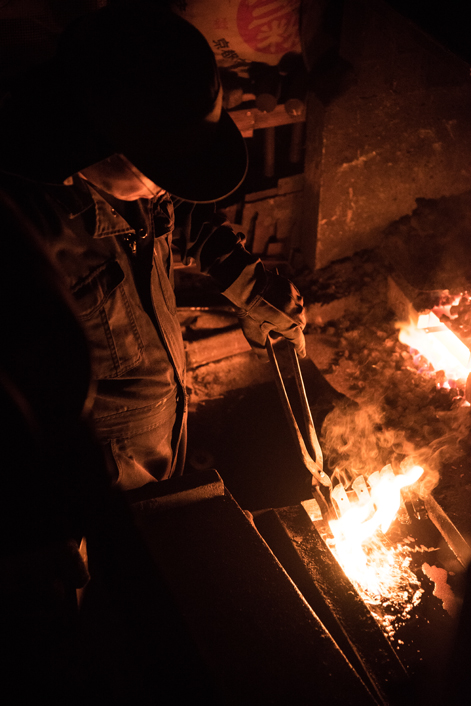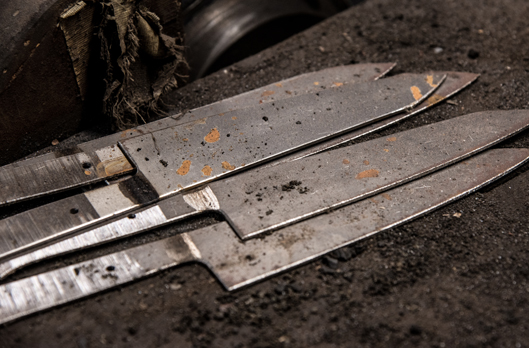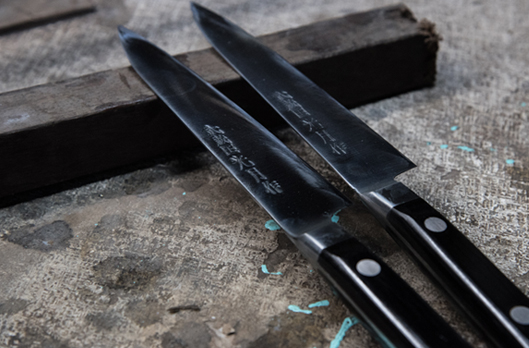Real People, Real Japan.
Kashiwa
Oideyo! Kashiwani
Goko Hamono Blademaker
Tell no Lie

One of Kashiwa’s gems
Kashiwa is home to Goko Hamono, one of Japan’s makers of hand-crafted Gyuuto kitchen knives under the Dentou (伝統) mark, given by the country for traditional crafts of high quality. Goko Hamono’s knives are used by professional chefs as well as ordinary people, in kitchens in Japan and all around the world. Making a knife, though, takes more than just creating and sharpening the blade. In the past, the process was divided among different professionals, from creating the blade to making and fitting the handle, while lately, with traditional arts on the decline, Goko Hamono has changed to creating knives from start to finish. And it is not enough to simply forge a blade: in Japan there is a whole philosophy behind it.
Quality over Quantity
Compared with machine-made mass production, where the push of a button might be all it takes, Goko Hamono’s knives are 100% hand-crafted, and are thus a rarity. The quality is on a completely different level. A hand-made knife from Goko Hamono is of course a kitchen tool first, but it also incorporates the soul and personality of its maker, from the tip to the ejiri (the end of the handle). Foreign customers happily waiting over a year for their personal Goko Hamono Knife are not unusual.
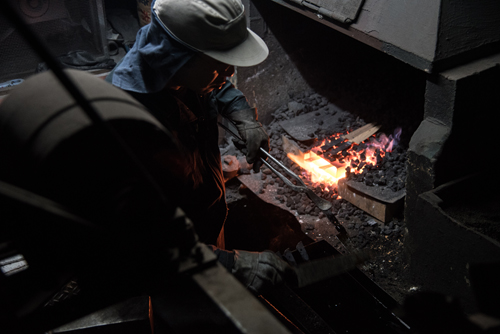
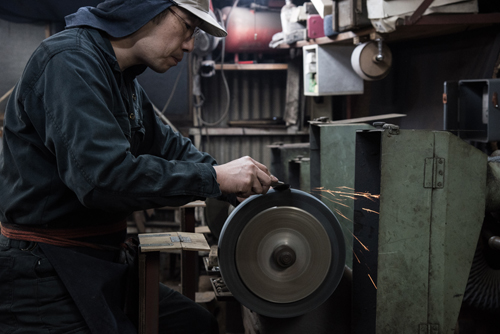
“The difference between creating art and making knives is huge. I have no intention of making something beautiful. I make something for cutting. It is not about the looks. I pour my soul into the things I make. That is the spirit of a blade maker.”
– Norihiko Yamakawa
A Goko Hamono Knife
The quote above illustrates exactly what makes a Goko Hamono knife special. Real handcrafted knives might not have a clean finish like machine-made ones, but, more than the looks, the functionality of the blade, the way it cuts, is most important. Looking at Goko Hamono knives, I find them beautiful as well as highly functional. Holding one of the blades allows you to feel the difference. The organic smell of mud, the slightly reflective surface, and the weight command respect for the knife and its maker.
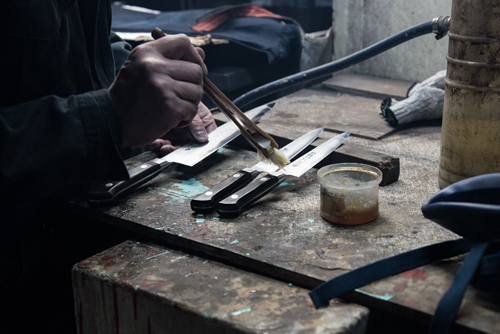

Who are Goko Hamono?
The owner and head of Goko Hamono is Norihiko Yamakawa. He has been working in the world of knives for over 50 years, and his knowledge and ideas are the driving force behind Goko Hamono. He dreams of leaving behind traditional techniques, skills, and the art of blade making for the generations to come, to ensure the continuation of this hand-crafted art in Japan. His story begins with jewelry and gemstones. Quickly realizing a mismatch between his own personality and that needed to be successful in the art of creating jewelry, a change in occupation saw him enter the world of blade making at the age of 21. Developing a deep relationship with blacksmiths from eastern Japan, Mr. Yamakawa and his family moved to Kashiwa while his son Yoshito was in kindergarten. Eventually establishing Goko Hamono at the age of 42, he enlisted the help of his son, a high school student at the time, in the business during its busy beginnings. Finally, following in his father’s footsteps, Yoshito began to pursue the path of becoming a blacksmith himself. Now, at 45 years old, he works with his father at Goko Hamono. Both exhibit a similar kind of aura, being simultaneously confident and humble.
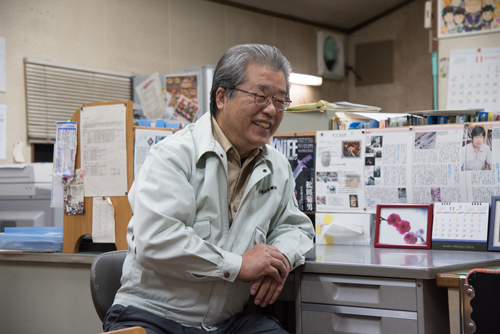
“Of course, if you make a product, you have poured your soul into it, and thus you take pride in it. However, you can never think that your product has no flaws. There would be no progression. You will also lose your charm as a person. That is why one should never call himself a ‘Shokunin,’”Yamakawa Yoshito says.
The soul of a “Shokunin”
According to Wikipedia, “Shokunin” is “a Japanese word for ‘artisan’ or ‘craftsman’, that also implies pride in one’s own work,” but there is a lot more to it. Talking to Mr. Yamakawa and his son, becoming a “Shokunin” seems to have a physical as well as a spiritual dimension. It is not just about creating an object, but also about pouring one’s character and soul into the object. A real “Shokunin” would not call himself a master or a teacher. He is always his hardest critic, continuously trying to improve his own work.
In the world of “Shokunin”, the concept of “Shiteidōgyō” (師弟同業) is very important. It emphasizes a close working relationship between master and student. A master learns as much from his student as the student learns from his master. “Shokunin” should never think of themselves and their products as perfect but are always looking for flaws to be corrected.
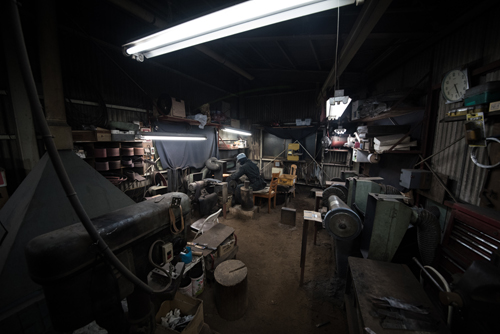
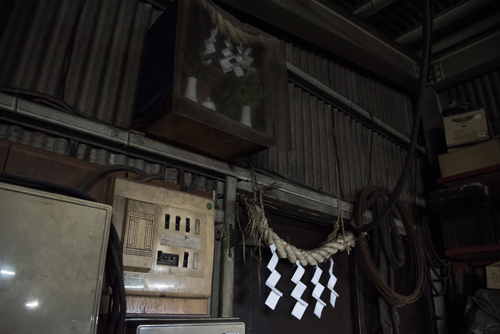
You want to become a “Shokunin”?
Seeking perfection in a craft usually takes several years or even decades; becoming a real “Shokunin” takes a lifetime. If you want to become a blacksmith for knifes, it takes about 3 years to be able to create just the basic form of the blade, and an additional 2 years until your knives are ready to be presented to customers. Yet these first 5 years are just the beginning of the journey. Working another 5 years enables blacksmiths to see flaws in their own work, while about 10 years on top of that will allow them to look back and start reflecting on their work, thus making even better knives.
Even though it takes a lifetime of passion and self-criticism to follow the path of a “Shokunin,” it has an aura of magic around it. Focusing body and mind on the perfection of a craft still fascinates many people around the world.
Deshi at Goko Hamono
Each year Goko Hamono has 2 or 3 people showing up at their doorstep, wanting to become “deshi” (students). While their ages range from 15 to 40 (and 40 is of course not too old to start learning a new skill), it could be hard for a person of a certain age to change their life and dedicate years to training, before reaping any benefits from their work. Currently Goko Hamono has one “deshi,” the 19-year-old Ashitani. He started working part-time in high school during summer breaks and continued to do so after graduation. Proving his dedication, Goko Hamono took him in as a full-time employee in April 2018. To be able to see the color of the flame and the steel in the forge (and thus the right temperature for forging) during bright summer days, he starts working as early as 3:00 am. From the early working hours, combined with a 1-hour bicycle ride every day to work, we can see Ashitani’s dedication. We should all root for him and hope for a bright future.
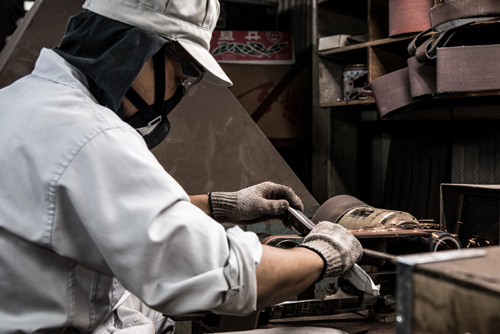
Tell no lies
Goko Hamono’s philosophy resonates in one’s mind, and Mr. Yamakawa’s words stay in your head. “I’ve been in this industry for 51 years, and I have never met anyone who lies. Someone like that is not a “Shokunin.” Blades are tools and should be used as tools, but they have the potential to hurt people. That’s why people who make blades can’t be liars” Mr. Yamakawa says in a serious voice. Every one of us can integrate a bit of the “Shokunin” spirit and the Goko Hamono philosophy into our lives. Pour your soul into whatever you do, never stop striving for improvement, be honest, and stay humble.
Goko Hamono
Address: 369-10 Fujigaya, Kashiwa City, Chiba Prefecture
URL: http://Gokouhamono.com/ (Japanese Only
TEL: 04-7193-0271
Opening Hours: ▶ Mon-Fri:9:00am-6:00pm
▶ Sat:9:00am-12:00pm
